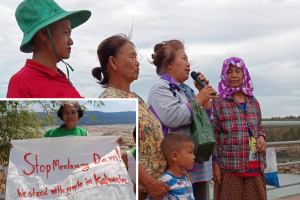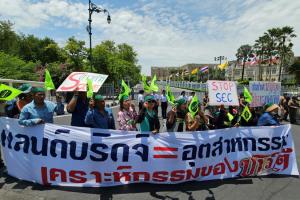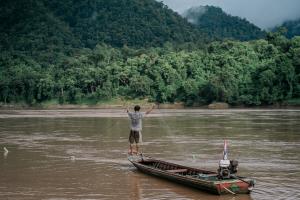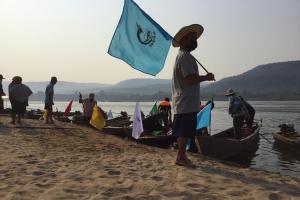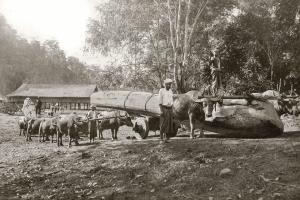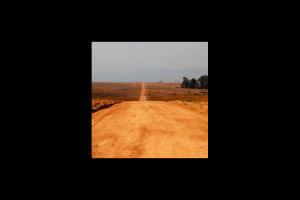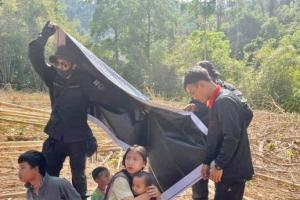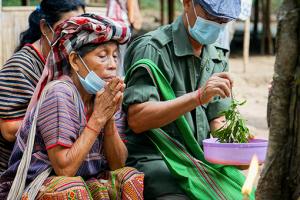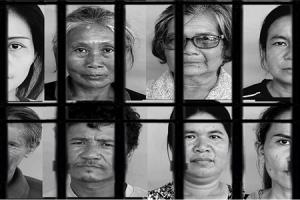“We know these projects are not truly green. When turbines come, birds will vanish. When mines come, dust will cover schools and homes. When forests are seized in the name of the government’s ‘forest reclamation policy’, the poor lose everything”, explains a Kham Pa Lai community grassroots organization that is resisting extractive industry projects.
Thailand
Bulletin articles
15 December 2025
Bulletin articles
15 October 2025
Whether they are in Brazil, amidst eucalyptus plantations, or in Thailand, surrounded by oil palm plantations, women suffer specific impacts from these monocultures. Women are on the frontlines of the resistance to these projects, which exploit and devastate the land in pursuit of profit. This is what two peasant activists fighting to defend the land – one from Brazil and one from Thailand – tell us.
Bulletin articles
23 April 2025
A new wave of expansion in hydroelectric power plant projects is advancing throughout the Global South under the pretext of producing 'clean energy', speed up the 'energy transition' and promote a 'low carbon economy'. On March 14, a group of communities issued a joint declaration denouncing the trail of destruction that major dams have left in their wake worldwide, rejecting further dam construction and shouting out, loud and clear: big hydroelectric power plants are not clean energy!
Bulletin articles
24 October 2024
With World Bank support, the Thai government is moving quickly to implement its ‘climate policy’ based on carbon offsetting through the use of so-called ‘green areas’. These areas are projected to cover no less than half of the country´s area. Yet hidden behind this ‘green’ discourse is an economic policy that is heavily reliant on the continued use of fossil fuels. (Available in Thai).
Bulletin articles
30 March 2023
Indigenous Peoples and communities in the forests of Thailand are threatened with policies that have added a new type of asset: carbon credits. The legislation passed in the name of conservation and climate mitigation is in fact designed to limit the use of forest communities of their land and forests while encroaching them into smaller areas.
Bulletin articles
16 June 2022
The nearly 5,000 km. of the Mekong River, which crosses six countries and sustains the lives and livelihoods of millions, is under severe threat due to the on-going construction of large scale dams. Communities are resisting what could be the final struggle to save some of the remaining parts of the River… of their lives.
Bulletin articles
23 March 2022
British firms not only controlled 80 per cent of the established ‘logging lands’ in Thailand, but they also influenced the establishment of the Royal Forest Department, which came to have total power over the nation’s forests. Massive land grabs and various colonial laws made half the country’s territory into a colony of the central state.
Bulletin articles
23 March 2022
Colonial and anti-colonial movements’ have deeply shaped the patterns and impacts of concessions in SE Asia. In some cases, communities have experienced dispossession through land grabs dressed as concessions. In others, concessions are part of a re-concentration of land holding. Either way, the concession model fits well with ideologies of modernisation.
Other information
17 December 2021
The Mekong/ASEAN Environmental Week (MAEW) is an annual regional platform and process for deeper sharing among people in the region of Southeast Asia, where key actors can exchange, analyze and debate on emerging issues that significantly affect them. This year the focus was on “Redesign ASEAN: Peoples' Voices in World Crises." Discussions covered the environmental situation as well as the economic, political, and other aspects that impact the region and its people.
Action alerts
3 August 2021
They have been living in the Kaeng Krachan forests for generations. When a National Park was created, they started to suffer violence and evictions. 22 people have been prosecuted this year. They could face a jail term of 4 to 20 years.
Bulletin articles
9 March 2021
Indigenous Karen People from Bang Kloi returned to their ancestral home in the Kaeng Krachan forests, after years of dispossession due to the creation of a National Park. Karen communities are mobilizing in solidarity to the Bang Kloi communities’ right to return home.
Bulletin articles
14 January 2021
How are forest crimes defined? In Thailand, forest-dependant communities, rather than the government and companies carrying out large-scale deforestation, became scapegoats for this destruction. (Available in Thai).


